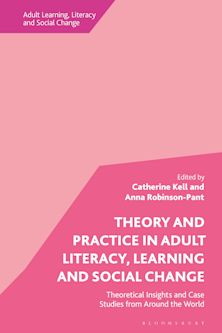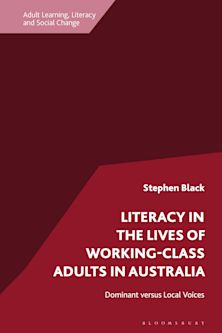Quantity
In stock
£171.00
RRP £190.00
Website price saving £19.00 (10%)
This product is usually dispatched within 10-14 days
- Delivery and returns info
-
Free UK delivery on orders £30 or over
This title is available for inspection copy requests
Description
New qualifications for those teaching and training in the FE sector became effective in September 2007. The reform of initial teacher training and the professionalisation of the workforce in the sector require a commitment to engage in continuing professional development.
The rational for the book is contained in the argument that improvement of quality in teaching and learning in the sector is not achieved exclusively through short-term external professional development and training activities. Moreover it requires ongoing workplace learning which is long-term in focus and practice-orientated and work-based. In order to improve future practice it needs to be embedded in critical reflection and evaluation of workloads.
The purpose of the book is to introduce the notion that there is an opportunity for every teacher to develop their role through their workloads, e.g. workloads are a vehicle for professional development. Ways to achieve this are identified by exploring the practice of experienced and successful teachers. The author then goes on to offers guidelines for promoting constructive practice, which is using the outcomes of reflection in the workplace to achieve role development.
The rational for the book is contained in the argument that improvement of quality in teaching and learning in the sector is not achieved exclusively through short-term external professional development and training activities. Moreover it requires ongoing workplace learning which is long-term in focus and practice-orientated and work-based. In order to improve future practice it needs to be embedded in critical reflection and evaluation of workloads.
The purpose of the book is to introduce the notion that there is an opportunity for every teacher to develop their role through their workloads, e.g. workloads are a vehicle for professional development. Ways to achieve this are identified by exploring the practice of experienced and successful teachers. The author then goes on to offers guidelines for promoting constructive practice, which is using the outcomes of reflection in the workplace to achieve role development.
Table of Contents
Introduction - Personalisation and constructive practice PART 1 - PAST POLICIES
Chapter 1 Workforce reforms
PART 2 -THE ROLE OF THE TEACHER
Chapter 2 Professional standards and code of practice Chapter 3 The role of the teacher and the teaching and learning environment
PART 3 - CONSTRUCTIVE PRACTICE
Chapter 4 Approaches to continuing professional development
Chapter 5 Professional development as constructive practice Chapter 6 Constructing a professional role
Chapter 7 Constructing professional knowledge
Chapter 8 Constructing professional relationships
Chapter 9 Constructing a repertoire of intellectual skills PART 4 - FUTURE PRACTICE
Conclusion - Continuing your professional development
Chapter 1 Workforce reforms
PART 2 -THE ROLE OF THE TEACHER
Chapter 2 Professional standards and code of practice Chapter 3 The role of the teacher and the teaching and learning environment
PART 3 - CONSTRUCTIVE PRACTICE
Chapter 4 Approaches to continuing professional development
Chapter 5 Professional development as constructive practice Chapter 6 Constructing a professional role
Chapter 7 Constructing professional knowledge
Chapter 8 Constructing professional relationships
Chapter 9 Constructing a repertoire of intellectual skills PART 4 - FUTURE PRACTICE
Conclusion - Continuing your professional development
Product details
| Published | 30 Oct 2009 |
|---|---|
| Format | Hardback |
| Edition | 1st |
| Extent | 272 |
| ISBN | 9780826425164 |
| Imprint | Continuum |
| Dimensions | 246 x 189 mm |
| Publisher | Bloomsbury Publishing |



































